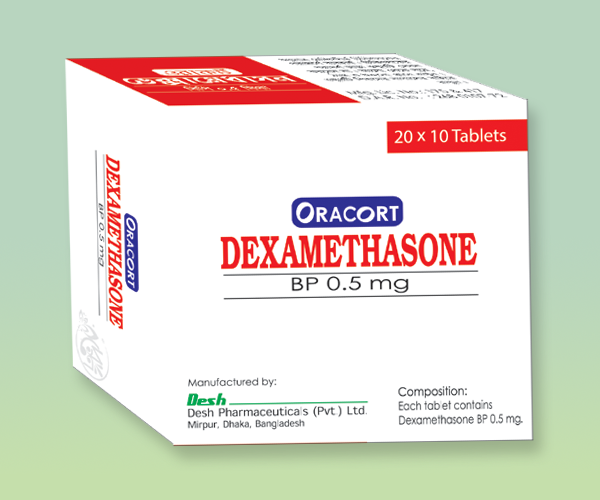Oracort
Dexamethasone BP 0.5mg
Oracort
Dexamethasone BP 0.5mg
Presentation
Oracort Tablet: Each tablet contains Dexamethasone BP 0.5 mg.
Description
Dexamethasone is a synthetic glucocorticoid with 7times higher anti-inflammatory potency than prednisolone. Like other glucocorticoids, dexamethasone also has anti-allergic, antitoxic, antishock, antipyretic and immunosuppressive properties.
Dexamethasone has practically no water and salt-retaining properties and is, therefore, particularly suitable for use in patients with cardiac failure or hypertension. Because of the long biological half-life (t½) (36-54 hrs), dexamethasone is especially suitable in conditions where a continuous glucocorticoid action is desired.
- AVAILABILITY: AVAILABLE
Indications
Immuno-allergology: In some cases, especially in exacerbation of systemic lupus erythematosus, nephrotic syndrome with minimal change lesions, periarteritis/polyarteritisnodosa, mixed connective tissue disease, arteritis temporalis; hypersensitivity reactions to drugs or chemicals, serum sickness, transfusion reactions, insect stings and bites, angioneurotic edema, severe hay fever, Stevens-Johnson syndrome; for chronic immunosuppression in transplantation patients.
Rheumatology: In general, as adjunctive therapy for short-term administration in serious cases of rheumatoid arthritis and rheumatic osteoarthritis, polymyalgia rheumatica, acute rheumatic carditis.
Endocrinology: Primary or secondary adrenocortical insufficiency and adrenogenital syndromes; polycystic ovary syndrome.
Dermatology: Severe cases of pemphigus and pemphigoid, exfoliative and other serious cases of dermatitis, mycosis fungoides, erythema multiforme, severe psoriasis.
Ophthalmology: Severe acute or chronic allergic inflammatory processes of the eye and its adnexa eg, allergic conjunctivitis, iritis, iridocyclitis, choroiditis, optic neuritis, sympathetic ophthalmia; scar-prevention in eye surgery and eye injuries.
Gastroenterology: To induce remission of ulcerative colitis and regional enteritis; in some cases of chronic hepatitis, especially the aggressive form with hyperimmunity; esophagitis corrosiva, in some cases of celiac disease, eosinophilic gastroenteritis.
Cardiology: In some cases of pericarditis (idiopathic, postmyocardial infarction and post-commissurotomic syndrome).
Pulmonology: Asthmatic pulmonary eosinophilia and allergic alveolitis, severe bronchial asthma and other chronic nonspecific obstructive lung diseases; diffuse interstitial pulmonary processes; as part of the treatment of laryngo-tracheobronchitisin combination with tuberculostatic therapy in fulminating tuberculosis.
Hematology and Oncology: Idiopathic and secondary thrombocytopenic purpura, autoimmune hemolytic anemia, idiopathic immunogranulocytopenia (agranulocytosis), acute and chronic lymphocytic leukemia, acute myelocytic leukemia (blastemic crisis), Hodgkin's disease, other malignancies of the lymphoid and histiocytic tissue, multiple myeloma, advanced myeloma refractory to alkylating agents, macroglobulinemia; as antiemetic in antineoplastic regimens; for palliative treatment in terminal stages of neoplastic disease.
Neurology: Cerebral edema, particularly those forms resulting from brain tumors, brain abscesses and neurosurgical interventions (in the latter case, also for prevention of brain edema); myoclonic seizures in epilepsy, pseudotumorcerebri, severe myasthenia gravis resistant to anticholinesterase therapy and thymectomy, in some cases of acute multiple sclerosis and peripheral neuritis; acute mountain sickness.
Other Indications: In most cases of tuberculous meningitis, pericarditis, peritonitis and pleuritis (in combination with tuberculostatic therapy); severe trichinosis, hypercalcemia eg, associated with neoplastic diseases, hypervitaminosisD, idiopathic infantile hypercalcemia.
Diagnostic Use: Dexamethasone suppression test.
Dosage and administration
* In general, glucocorticoid dosage depends on the severity of the condition and the response of the patient. Under certain circumstances, for instance in stress and changed clinical picture, extra dosage adjustments may be necessary. If no favorable response is noted within a couple of days, continuation of glucocorticoid therapy is undesirable.
* Usually, daily oral dosages of 0.5-10 mg (1-20 tablets) are sufficient.
* In some patients, higher dosages may be temporarily required to control the disease. As soon as symptoms diminish, dosage should be reduced under continuous observation of the clinical picture to the lowest possible level or tapered off completely. This should be done by giving in the early morning, daily or preferably every other day, 1 dose of a glucocorticoid with a shorter biologicalhalf-life(t½) than dexamethasone eg, prednisolone.
* For a short dexamethasone suppression test, dexamethasone 1 mg is given at 11 pm and plasmacortisol is measured in the next morning. Patients who do not show a decrease in cortisol can be exposed to a longer test: Dexamethasone 0.5 mg is given at 6-hr intervals for 48 hrs followed by 2 mg every 6 hrs for further 48 hrs. Twenty-four hour urine collections are made before, during and at the end of the test for determination of 17-hydroxycorticosteroids.
Dexamethasone tablets should be taken orally, preferably with some fluid.
Contraindication
Generally it is contraindicated inthe followings cases:
1.Gastrointestinal ulcer
2.Acute or chronic infections
3.Osteoporosis
4.Pregnancy
5.Diabetes mellitus
6.Renal insufficiency
7.Hypertension
8.History of psychotic illness
9.Immediately before prophylactic immunization
Side-effects
Adverse reactions, associated with prolonged systemic glucocorticoid therapy, are unlikely when high doses are administered over a short period of time. Nevertheless, gastric and duodenal ulceration, with possible perforation and hemorrhage, may occasionally occur.
Dexamethasone is generally well tolerated in standard low doses. Nausea, vomiting, appetite, obesity may occur. Higher dose may result behavioral & personality changes.
Precaution
The drug should be used with caution in the presence of congestive heart failure or hypertension, in patients with diabetes, epilepsy, glaucoma, infectious diseases, chronic renal failure and in elderly persons.
Use in pregnancy & lactation:
Pregnancy:
There are insufficient data on the use of dexamethasone during pregnancy. However, there are indications for a harmful effect in animal experiments.
Lactation:
Glucocorticoids appear in breast milk in very small quantities, but it is unknown whether this can adversely affect the infant. So, Mother taking high doses of glucocorticoids should be advised not to breast-feed.
Overdosage
In animal experiments the acute toxicity of dexamethasone has been shown to be rather low. Symptoms of acute overdosage that can occur are nausea and vomiting. If vomiting has not yet occurred this can be provoked. For the rest a symptomatic treatment is probably sufficient.
Drug interactions
The specific drug interaction with Dexamethasone is not well established.
Storage
Store in a cool, dry place and protect from light. Keep out of reach of children.
Packing
Oracort Tablet: Box containing 10 X 10 / 20 X 10/10 X 50 / 50 X10 tablets in blister pack.
